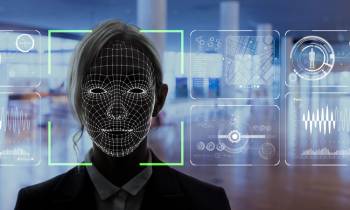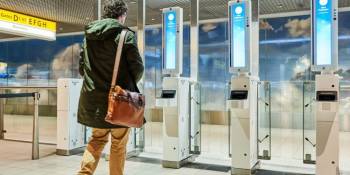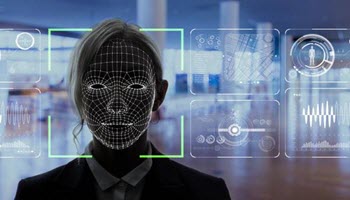 Let me take a wild guess at something. Everyone who is reading this now hates going to the airport. No, I don’t mean you hate flying or traveling. I mean you hate going to the airport. The long lines, the constantly changing rules about baggage and fees. Then there’s the Transportation Security Administration (TSA) with their unpacking of laptops, taking off shoes and occasional pat-downs. Finally, you’ve made it to the gate, but only to wait through another long line of passengers trying to board the plane. It’s a pretty awful experience. But there’s one solution that promises to change it all– biometrics.
Let me take a wild guess at something. Everyone who is reading this now hates going to the airport. No, I don’t mean you hate flying or traveling. I mean you hate going to the airport. The long lines, the constantly changing rules about baggage and fees. Then there’s the Transportation Security Administration (TSA) with their unpacking of laptops, taking off shoes and occasional pat-downs. Finally, you’ve made it to the gate, but only to wait through another long line of passengers trying to board the plane. It’s a pretty awful experience. But there’s one solution that promises to change it all– biometrics.
Biometrics aren’t new, or at least the idea of them isn’t. We’ve seen these ideas in spy movies, books and pop culture. The reality is that they’re here and have been here for a while. A lot of our phones now have a fingerprint scanner and some even scan your face to unlock. Well, this technology is expanding our phones into the surrounding world, and we should be more informed about what exactly this technology does and doesn’t do.
Back to our airports. Biometrics at the airport could begin from the moment you step in the door. Certain airlines are opting to do check-in and identification procedures through a biometric facial scan. Delta, for instance, has installed this technology at Hartsfield-Jackson airport in Atlanta. Their technology will act as a door-to-gate identification process. You’d scan in once you come in, scan in at the gate to board and in the future, scan at TSA where all your identification and passenger information would be accessible. It seems like it could save a lot of time in lines, but the problem is, what if it doesn’t?
 We all know how new technology can be– buggy and glitchy. When you go to scan your face, what if it doesn’t recognize your new facial hair since your last ID headshot? Apple’s Face ID on their new iPhones tends to do a pretty good job working around that, but it’s also expensive. Airlines are notorious for cutting costs and corners. Would they be inclined to buy the best identification tech? Who knows. Outside of glitches, some people just plain aren’t comfortable with the privacy around this concept. NBC News conducted a study where 49% of readers didn’t mind some facial scans to a degree, 40% would oppose facial scanning, and 11% are undecided. One thing is clear– the public is pretty unsure about this new technology.
We all know how new technology can be– buggy and glitchy. When you go to scan your face, what if it doesn’t recognize your new facial hair since your last ID headshot? Apple’s Face ID on their new iPhones tends to do a pretty good job working around that, but it’s also expensive. Airlines are notorious for cutting costs and corners. Would they be inclined to buy the best identification tech? Who knows. Outside of glitches, some people just plain aren’t comfortable with the privacy around this concept. NBC News conducted a study where 49% of readers didn’t mind some facial scans to a degree, 40% would oppose facial scanning, and 11% are undecided. One thing is clear– the public is pretty unsure about this new technology.
Let’s move deeper into the airport. Good old popular TSA has some ideas of their own on biometric scans. We already know how well their full-body scanners went over when it was revealed they were too, well, revealing. Aside from their fairly successful PreCheck Program, TSA is looking into better technology that may be able to scan for weapons remotely, scanning the moment you walk through the door. This would eliminate or cut down on some of the lines through security, as they could see what hazardous objects are in everyone’s luggage from afar. When it comes to the scans themselves, the TSA released its roadmap which suggests that in the future all travelers would go through a facial scan to confirm identity.
While traveling through the major choke points of an airport a bit faster would be a huge bonus, let’s review what the risks are. Once in the airport, you’ve now had to scan your face multiple times and give that information to the airline, the TSA, and I wouldn’t be surprised if in the future, Starbucks requires it, too. With the number of leaks and hacks there have been on personal data, a breach is definitely in the future for biometric data. The question becomes, how will hackers and thieves be able to use that against you? That there is the real conversation waiting to happen. When it comes to social security numbers (SSN), ID numbers, and other information, it can be easily manipulated to steal your identity. Hackers can sell your SSN, open up new cards without you knowing, or access your bank information, all from one big breach. But let’s think about a face scan. They can’t just send the file of your face scan to a credit card company. No, a face scan has to be unique to you. So could it be that this is actually the most secure way to identify people?
 Privacy concerns come out because when people have our information, they can use it against us. If facial recognition becomes the norm, then we would have to appear in person and present our faces to access our information. That becomes much more challenging for hackers to replicate. 3D printing is nowhere near advanced enough to print a realistic face, and a picture would be no good. So we have to ask ourselves, is it worth giving up one of our most unique features for better privacy? Is there a risk of compromise if we have our faces scanned all over the internet? What could go wrong? As with all new and emerging technologies, there are more questions than answers. There’s one thing we all must do– have a conversation about it.
Privacy concerns come out because when people have our information, they can use it against us. If facial recognition becomes the norm, then we would have to appear in person and present our faces to access our information. That becomes much more challenging for hackers to replicate. 3D printing is nowhere near advanced enough to print a realistic face, and a picture would be no good. So we have to ask ourselves, is it worth giving up one of our most unique features for better privacy? Is there a risk of compromise if we have our faces scanned all over the internet? What could go wrong? As with all new and emerging technologies, there are more questions than answers. There’s one thing we all must do– have a conversation about it.
—
